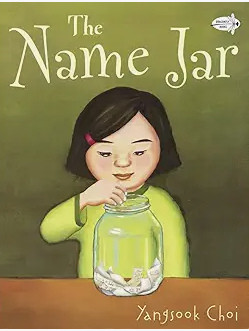Book Review: The Name Jar
1.
BIBLIOGRAPHY
Choi, Y.
(2003). The name jar. Dragonfly Books. ISBN: 978-0440417996
2. PLOT SUMMARY
Being the new kid in school is hard enough, but what happens when nobody can pronounce your name? Having just moved from Korea, Unhei is anxious about fitting in. So instead of introducing herself on the first day of school, she decides to choose an American name from a glass jar. But while Unhei thinks of being a Suzy, Laura, or Amanda, nothing feels right. With the help of a new friend, Unhei will learn that the best name is her own.
3.
CRITICAL ANALYSIS
This is another beautiful story! I have this book in
my current collection, and I can’t believe I have never read it before, but it
is a book I will be showcasing in my library. I loved seeing how Unhei
introduced herself using her name and not one from the name jar. I also loved
reading how her classmates embraced her name and how Joey got a Korean nickname
that meant friend. I also felt this
story accurately depicted Korean culture by highlighting Korean names'
importance and explaining that names are usually chosen to signify something. I also liked how they used small details to
bring cultural relevance, such as the small wooden block in the red pouch. Another important aspect of this book was the
pronunciation guide. The story shows how Unhei teaches others how to pronounce
her name.
The illustrations were great, too! The pictures were
so vivid and helped tell the story. Unhei was not illustrated to resemble a
stereotype. The illustrations did a great job of showcasing small details that
were unique to Korean culture, such as the store near Unhei's house and the
Korean writing outside the store.
4.
REVIEW EXCERPT(S)
Starred review in Booklist:
Ages 4-8. Unhei has just come with her family from Korea and is starting
school. Her name is pronounced Yoon-hye, which means grace, but she feels
awkward about it after some teasing on the school bus. She decides to choose an
American name, and her classmates oblige her by filling a glass jar with their
suggestions. Her mother reminds her that she and her grandmother went to a name
master for Unhei's name, and Unhei practices stamping her name with the
beautiful name stamp her grandmother gave her. Finally, Unhei decides to keep her
own name, and one of her classmates even has a stamp made for himself with the
Korean characters for friend. The paintings are mostly in gold and earth tones,
and the figures have both stature and simplicity--as does the story.
Starred review in
School Library Journal: K-Gr 2-On the way to her first day of school, Unhei is
teased by the children on the bus for her Korean name. When she reaches her
classroom and is asked her name, she tells her classmates that she has not yet
decided on one. To be helpful the children put their suggestions into a
"name jar." Eventually the girl decides to keep her own name as one
of her classmates takes pride in the new Korean nickname he has chosen, Chinku,
meaning "friend." The round, red imprint of the Korean character for
Unhei's name provides the graphic manifestation of the story's theme.
Attractive golden endpapers feature random repetitions of the stamp imprint
interspersed with her classmates' handwritten suggestions on scraps of torn paper.
The bold, bright paintings that illustrate the story are realistic, warm, and
appealing. Unfortunately, the text sags under the weight of its mission to
describe how it might feel to immigrate. A well-meaning and visually attractive
effort, but uninspired.-Dorian Chong, School of Library and Information
Science, San Jose State University, CA Copyright 2001 Cahners Business
Information.
5.
CONNECTIONS
*Engage students in a small research to investigate
the meaning behind their names. Have students share their findings with their
classmates.
*Engage students in a discussion about the different themes
found in this story. What did they learn from this story? What were some themes
they found? Have students share their thoughts with others.
*Similar books to The Name Jar
Martinez-Neal, A. (2018). Alma and how she got her
name. Candlewick Press.
ISBN: 978-0763693558
Recorvits, H., & Swiatkowska, G. (2014). My name
is Yoon. Square Fish.
ISBN: 978-1250057112
Book review completed for SHSU MLS course.



Comments
Post a Comment